Text
Doing mental backflips to contrive textual evidence for your projection-based headcanons is only cowardice if you won't admit to yourself that you're projecting. If you approach it less from the standpoint of "well, actually" and more form the standpoint of "prove me wrong, fucker", it's enrichment.
2K notes
·
View notes
Text

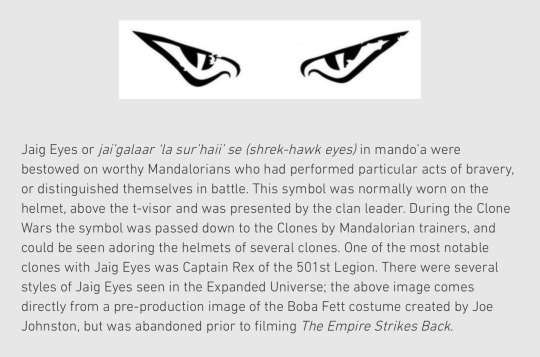
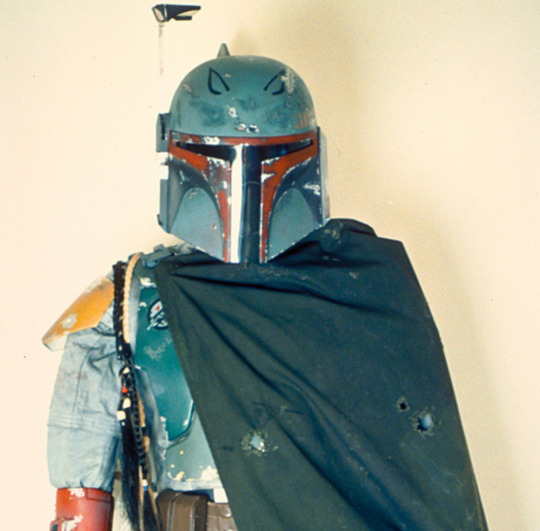

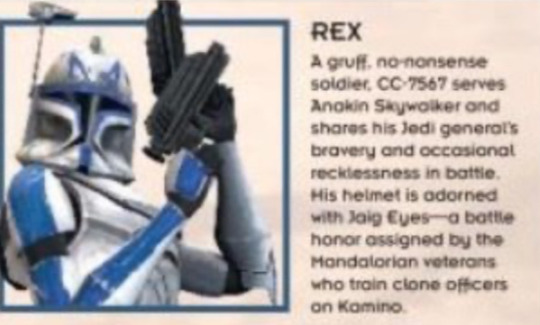
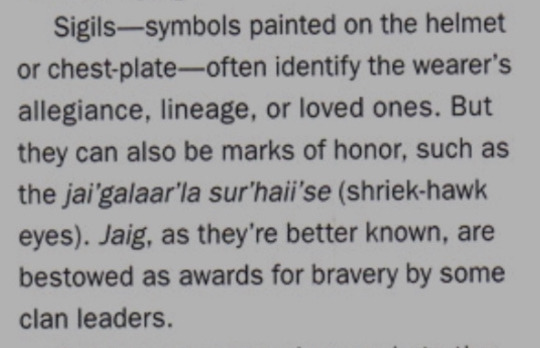
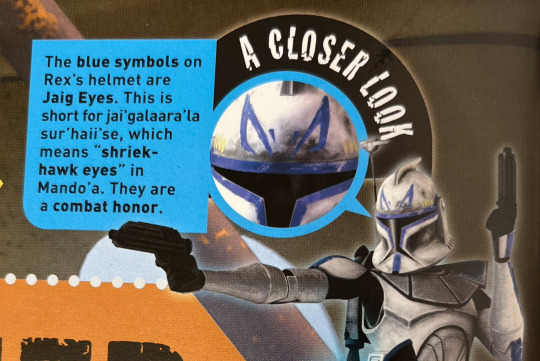
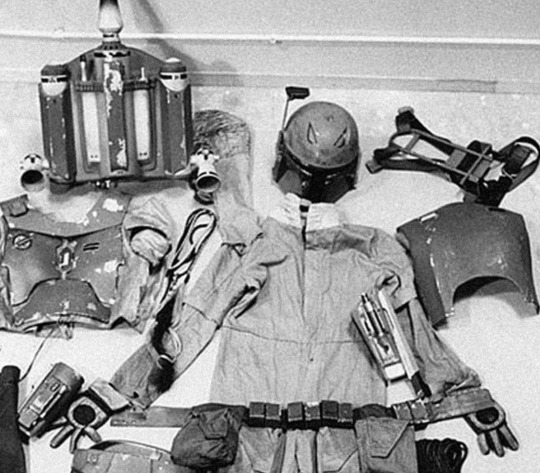
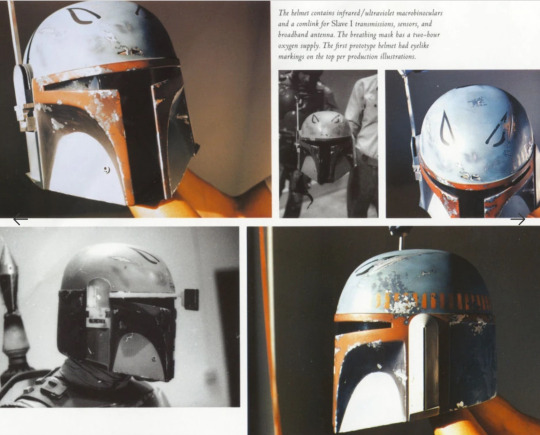
JAIG EYES
SOURCES: STARWARS.COM DATABANK (2017), The Mandalorians: People and Culture (2006), Star Wars: The Clone Wars: The Visual Guide (2008), Star Wars: The Clone Wars: New Battlefronts: The Visual Guide (2010), bobafettfanclub.com(2023), Star Wars: Absolutely Everything You Need to Know, Updated and Expanded (2017)
846 notes
·
View notes
Text
Briikase din'kartay, anade! AO3 (Archive of Our Own) has added Mando'a as a language option for works uploaded to the site. This means you can now filter for works written primarily or exclusively in Mando'a. Right now, there are 12 works filed in the Mando'a language tab, but as this is a recent update expect more to make their way into the tag over time. A good opportunity to practice Mando'a and contribute to the tag!
143 notes
·
View notes
Note
Please help me! I’ve been trying to find the mandalorian word for ‘tiger’, I need it for my story. The title will be ‘Adorable little tiger’, I just need the ‘little tiger’ translated for me. It’s can be anything at all, please help me! 🙏 😊
Unfortunately, there is no canon word for "tiger". Off the top of my head, there's no fan dialects that have an established word for it either, though the MC dictionary has "akaan'uliik" (war-creature) for "lion". If that's not what you want, you'll have to get creative by making the word from scratch.
As far as the adorable/little part, that I can help with! You want the suffix -'ika. Just slap that baby at the end of any word to show your affection (ra duraan, nayc ner bor).
If anyone has a suggestion for "tiger", feel free to chime in.
12 notes
·
View notes
Text
Numbers
What's 6 in Mando'a? What about 501st? How do you say "execute order 66"? In this blog post, we'll cover the Mando'a cardinal and ordinal number system, how to make any number from 0-9,999 and other words useful when discussing number and math. Sources are indicated with symbols (^ *) and listed at the bottom.
Numerals
Mando'a uses a base-5 numbering system supplemented with base-10 suffixes. This means 1-5 are unique words along with 0, 10, 100, and 1000. All other numbers are a combination of those words. As it stands, KT Mando’a allows us to count up to 9,999. Here are the counting numbers:
0 - naas^ (literally "nothing")
1 - solus (prefix: sol)
2 - t'ad (prefix: ad)
3 - ehn (prefix: ehn)
4 - cuir (prefix: cur)
5 - rayshe'a (prefix: she)
6 - resol (prefix: rol)
7 - e'tad (prefix: tad)
8 - she'ehn (prefix: shen)
9 - she'cu (prefix: shek)
For the tens place numerals (20, 30, 40, etc), add the “tens” suffix -’eta to the prefixes above above. 0 and 1 do not act as prefixes for counting purposes. 10 is a unique number (ta+raysh aka "two fives").
10 - ta'raysh
20 - ad'eta*
30 - ehn'eta*
40 - cur'eta*
50 - she'eta*
60 - rol'eta*
70 - tad'eta*
80 - shehn'eta*
90 - shek'eta*
For the hundreds place numerals, the principle is the same. Add the “hundreds” suffix -’olan to the original numbers. Like 10, 100 is a unique number.
100 - olan*
200 - ad'olan^
300 - ehn'olan^
400 - cur'olan^
500 - raysh'olan*
600 - rol'olan^
700 - tad'olan^
800 - shen'olan^
900 - shek'olan^
For the thousands place numerals, the pattern continues. The suffix for “thousands” is a conjunction between the suffixes for “ten” and “hundreds”, -’eta’olan. This makes it literally “tens of hundred”. 1000 is an exception to the rule and is instead “ten hundred”.
1000 - ta’raysh’olan*
2000 - ad’eta’olan^
3000 - ehn’eta’olan^
4000 - cur’eta’olan^
5000 - she’eta’olan*
6000 - rol’eta’olan^
7000 - tad’eta’olan^
8000 - shen’eta’olan^
9000 - shek’eta’olan^
More Numbers
To fill the gaps in the above list, simply write out each place with a space between. Eleven (11) is ta'raysh solus*. Two hundred-sixty-three (263) in English is ad’olan rol’eta ehn^ in Mando’a. "Execute order sixty-six" becomes "Ke narir haar’ke’gyce rol’eta resol".
Ordinals
To turn a numeral into an ordinal (1 to 1st or 10 to 10th), add the descriptor suffix -yc. Theoretically this should also work with the suffix -la, but -yc is the one explicitly acknowledged in the KT dictionary. The last (singles) place numeral receives the descriptor suffix. E.g. she’olan sol'yc (501st) or cur’etayc (40th)
Other Useful Words
Soletar, verb, "to count"
Sosol ti, phrase, "equal to"
Majycir, verb, "to add"
Te'habir, verb "to remove or take out" aka subtract
There's no ready answer for "multiply" or "divide", though creative use of tatugir "to repeat" could work in some cases. Fractions might be verbally represented as solus be ta'raysh "1 of 10" or some other prepositional combo that can also represent division. "Mathematics" also doesn't have a dedicated word, but "to calculate" is mirdir.
"But do Mandalorian space-barbarians really need to know math--"
Yes. Ballistics. Logistics. Counting pay. Math is everywhere, it is inescapable. Inevitable. Evil Essential.
Sources
Words without source symbols are from officially published works by Karen Traviss, namely the Republic Commando novels. Reference this index to see the book & page number.
Asterik* words are from the lexicon Karen Traviss published digitally, which is hosted as-is on Mandoa.org without alterations (or corrections).
Carat^ words are derivations from the canon words' established patterns. As such, if you want to go with a different interpretation, have fun! These are suggestions and I ain't a cop. We'll answer follow-up questions on how they're derived, but we're not interested in arguing merits of one interpretation over another.
#mando'a#mandoa#conlang#star wars#mandalorians#numbers#counting#fucking MATH can't believe yall brought me outta retirement for MATH#language#linguistics#the mandalorian#legends canon#extended universe canon
181 notes
·
View notes
Text
Mandalorians in the Movies
Here are all the official Star Wars movies that Mandalorians appear in, in chronological order:
Star Wars Holiday Special (1978)
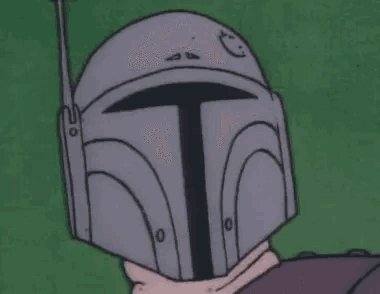
The first appearance of Mandalorians in all of Star Wars is in the Star Wars Holiday Special. Though the special overall is not critically acclaimed, the 11-minute animated feature starring Boba Fett is much more tolerable.
The Empire Strikes Back (1980)
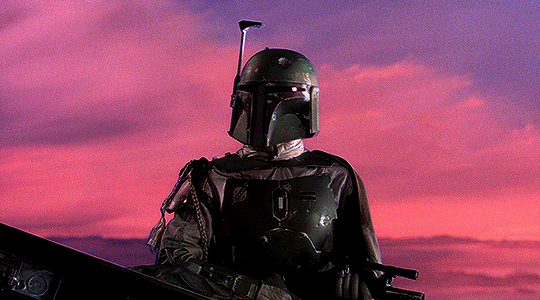
The Empire Strikes Back is where we see the first live-action appearance of a Mandalorian. Boba Fett is a bounty hunter who works for Darth Vader and Jabba the Hutt.
The Return of the Jedi (1983)

Boba Fett also returns in The Return of the Jedi. He's well-liked and respected in Jabba's Palace, up until Han's lucky shot puts him in a Sarlacc's stomach.
Attack of the Clones (2002)
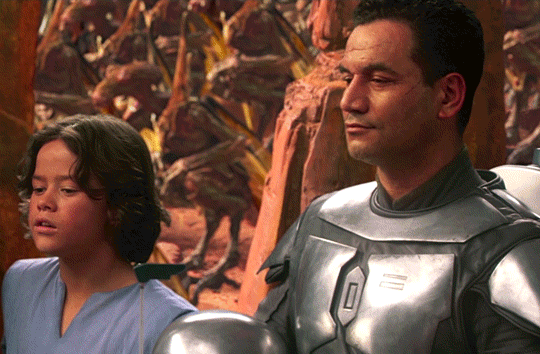
Jango Fett is the template of the titular clones and also Padme Amidala's would-be assassin. This is the longest-lived appearance of any Mandalorian in the movies.
#star wars#mandalorians#gifs#primary sources#movies#star wars holiday special#the empire strikes back#the return of the jedi#attack of the clones#sw prequels#sw original trilogy
21 notes
·
View notes
Text

Inside Mando'a Culture and Language
February 15, 2006
By Bonnie Burton; Illustrations by Tom Hodges
There's more to a man than just his armor, and in Star Wars Insider #86, Republic Commando. Hard Contact and Triple Zero author Karen Traviss takes a closer look at both the unique culture and language of the mighty Mandalorians. Covering everything from the origins of the people to their nomadic lifestyle, Traviss wanted to be very straightforward about their pragmatic view of society.
[Below the cut: the rest of the article. Original link lost, may have been hosted on Hyperspace Forums. Word Doc format]
"Mandalorians struck me as adopters," Traviss says. "What little we already knew about them said they weren't the original Mandalorian race -- they seemed to borrow a culture from another species -- and we know that they adopted kids like Jango Fett. I thought those two things made sense if I viewed their whole culture as being that way it's about what you do not where you were born. In general, Mandalorians don't sit around and talk about it -- they do it."
Adds Traviss, "If you're willing to adopt a culture as well as people, you're clearly more concerned with behavior than with simple bloodline. If you look around, you'll see that even late into their history there are non-human Mandalorians around. It might seem odd for a people with such a violent reputation, but they're actually very tolerant. They don't care who your parents were. They don't care how much money you have or how many titles you've got. All they want to know is if you're prepared to live by a Mando code. If you do, then you're in -- regardless of species, disability, age or anything. All welcome -- but you better live up to the code."
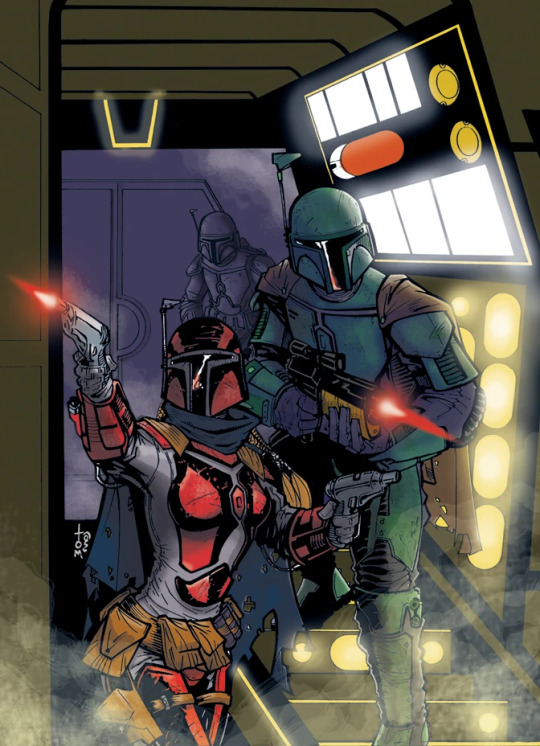
This equal opportunity mentality crosses gender lines, and Mandalorian women are expected to follow the code as well and be ready for battle, whether it's alongside the men on the battlefield or defending the homestead. "If you want to sit around and file your nails, the Mando life isn't for you," Traviss says. "Keeping a home going when your menfolk are away for long periods is very, very hard -- even if you're back on Mandalore. It's not a wealthy world and there have been long periods of struggle and poverty You have to be able to defend yourself and your family, too. There's a Mando proverb I use in Legacy of the Force. Bloodlines -- 'Teach your sons to be strong, but your daughters to be stronger.' They're very much a frontier people at heart. It's self-selecting; wimps need not apply A Mando male knows the value of a tough woman."
With the Mandalorian preference for less talk, more action, dating is considerably streamlined and to-the-point. "If you want to do more than just get to know the Mando guy or gal you fancy, or gaze at each other over a pint of net'ra gal, then you better be serious about it or else you might get the prospective parents-in-law showing up with blasters," Traviss warns. "These folks are regarded as adult at 13, and they tend to settle down early Mandos don't like to lose people from the community, either, so 'marrying out' is a blow to them: they want people to enter the culture rather than leave it. The cultural pressure is to get hitched, because strong family units are the core of the community They're a lot more relaxed within a Mandalorian community, but if you're from outside, attempts at casual romance of the physical kind will be seen as a threat until you show signs of joining them."
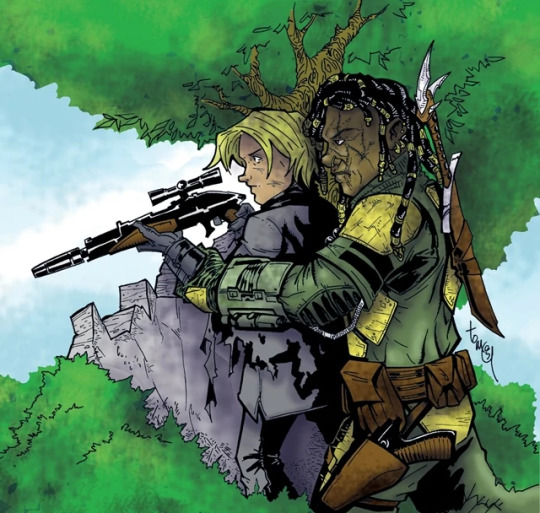
You might as well forget any idea of a lavish wedding, too. As seen with their rather blunt vows in the Insider article, long celebrations to declare undying adoration isn't their way "Mandos know what they want and they don't beat about the bush: they get on with it," Traviss says. "Why have a long ceremony? Commitment to each other, whether together or separated, and to the kids you bear or adopt, is everything. Husband and wife have equal responsibilities. They don't need to say any more than that. They'd be appalled by our western tradition of spending more time planning the wedding gown, the guest list and the flowers than working out what to do with the rest of your lives together I can almost hear them: 'All this effort and waste for one day?'"
The Mandalorian way of life may seems very specific, but according to Traviss this doesn't mean the only profession for a Mando is that of a soldier or bounty hunter "They do what most societies do -- back on Mandalore, many would be farmers or work in factories," Traviss says. "They design weapons and vehicles. They're doctors (battlefield medicine is their specialty) and engineers. But they can all fight. They all learn to be warriors. It's their core skill, and their pride. Think of it almost like a nation where everyone does military service at some time, only more so. Military skills are skills for life.
A big part of the Mando'a culture also includes an elaborate, yet easy-to-learn language. When Traviss was asked to write her first Star Wars novel, Hard Contact, it was up to her to expand on the Mandalorian language with only a song to get her started. "LucasArts game producer Ryan Kaufman sent me a copy of Jesse Harlin's lyrics and asked if they were any use to me in writing the book," Traviss recalls. "I jumped on them right away Language and culture are indivisible. If I wanted to understand the characters, I needed to know their language. So I built it."
To tackle the project at hand, Traviss deconstructed the Republic Commando game lyrics to look for the language's structure and patterns. "Jess had to create lyrics that could be sung, because that was his primary objective, so he needed to get syllables to fit rhythms. But I needed to reconcile that with a structured grammar Jess shared his thoughts with me about how he developed the sounds and I stuck with that softer sound he'd created. He took his sounds from Latin and Hungarian, and I added on some sounds from Urdu, Gurkhali and even Romany I gave it a Hebrew rhythm and the end result sounds almost like Russian and Gaelic crossed with Hebrew From one or two words -- I started with structuring singular from plural and adding adjectival endings for Hard Contact -- it just took me over completely It's a living language to me."
While real-world cultures take a few centuries to develop a language, Traviss (in true Mando'a fashion) created a working new language in only 6 months. "I was surprised how fast it happened, and how organic it became right away," Traviss says. "I didn't make up words out of the blue, bar two or three specific ones. They evolved. Knowing the Mandalorians (in my head) told me what I needed to know about how they saw the world, and that shaped the language -- just as it does in the real world. I'm not an academic linguist, just someone who learned a lot of languages over the years. (And promptly forgot most of them.) As long as I stuck to thinking, 'If I'm a Mando, what do I think when I look at this object, or when I do this action?' then it just flowed."
Traviss adds, "I did use Mando'a to pay homage to a few things, though. For example, the word dinii is taken from 'dinny,' my local Portsmouth (UK) dialect for idiotic or mad. We also use the word dinlo -- a mad or stupid person -- which some sources believe comes from the Romany language. (Readers may spot that word in my upcoming book Triple Zero, but I'll leave the explanation of Skuumaa for later!) I also called a military backpack a birgaan because a Royal Marine calls his a bergen, which is in fact a trade name. A Bergen pack is brammers (the best), as we say in Portsmouth."
As the language developed and evolved, Traviss also looked for helpful advice from her fans and colleagues. "An Insider reader, Ray Ramirez, is one of my beta testers," Traviss says. "I started corresponding with Ray after he had a letter in Insider about the military detail in Hard Contact (he served in Iraq as a sniper) and we became good friends. The other tester was Ryan Kaufman. I gave both of them the dictionary at various stages and asked them to see what they could make from it. Ray wrote military op orders; Ryan wrote epic poetry and the pre-hunt chant quoted in the feature; and I wrote vulgar drinking songs, conversation pieces, legal documents and translated text like the Revenge of the Sith crawler Once I'd seen just how flexible it was, I started putting a few words online on my starwars.com VIP blog and fans joined in. It was fascinating to see how differently people used it, and even with the few words I released, people were making up coherent sentences and really getting into the spirit of the language. It wasn't easy for them because they didn't have enough words to work with, but they were making excellent guesses. It was really exciting to see a language evolving with real speakers, just like a real language but with the process speeded up."
The Mando'a language remains unique to fans not just for its multi-cultural influences but also for its gender-less vocabulary and focus on the present tense. "I decided to scrap gender for three reasons," Traviss says. "It makes the language simpler; I couldn't see the Mandalorians having the patience to worry about nouns with different genders; and it fitted the Mando view that gender was one of those things that didn't matter The fact that buir means both mother and father ended up as a neat reflection of the fact that both parents -- all parents -- have the same responsibilities. Also would a Mando want to bother with the subjunctive or the pluperfect? Nah. They live in the simple present. Their past is always with them, and they don't know if they'll be around tomorrow So they started with present tense only, and other Mandos understood what time period they meant. They added the tense prefixes later in history because the aruetiise got confused, and that was bad for business. All that contributed to a really simple, logical and colorful language that depended on word order rather than cases and other complex grammar "
Of course, even though the Mando'a language was made to be easy to learn, readers may come across a few phrases that simply cannot be directly translated into English, such as Oya Manda. "It's an expression of Mandalorian solidarity and perpetuity emotional and assertive, like 'Hey, we're Mandos and we're proud and we're going to be around forever!'" Traviss says. "Oya on its own has many meanings. Literally, it's 'Let's hunt!', as Walon Vau does in Republic Commando: Triple Zero. It's derived from the verb oyacyir (to live) which is connected to the verb for hunt, oya'karir, as Mandos see life as a hunt. So it also means 'Stay alive!' -- the kind of farewell wish soldiers would make to each other But it's also 'Hoorah!', 'Go you!' and 'Cheers!' It's always positive and triumphant."
Traviss is eager to see how dedicated fans approach learning the new language she's created for a people she holds close to her heart. "I was determined to make this a natural language, not just a set of rules," Traviss says. "I wanted something flexible and full of idiosyncrasies and for it to feel lived in. No complex grammar, no difficult pronunciation, no silent letters, and lots of scope for making it your own language from the basic tools. It doesn't matter what accent you have; you can speak Mando'a and be understood by another speaker Even the punctuation and 'breath' mark -- the beten -- is variable and no Mando is going to mind if you use it differently There are all kinds of ways of expressing something. The Mandalorian written font has no capitals or lower cases, so Basic grammar is always going to be a foreign concept to them -- they don't get hung up about grammar It's primarily a spoken language, anyway This is just the first 1,000 or so words. The average well-educated English speaker uses a vocabulary of 2,000 words in a week, so I'm aiming for that total as the critical mass. I'll be adding to the language as I go and updating regularly"
© Lucasfilm 2006. All rights reserved. LUCAS ONLINE
/end article
#Star Wars#Mandalorians#Mando'a#primary source#Karen Traviss#article#web article#mandalorian culture#conlang#Inside Mando'a
35 notes
·
View notes
Text
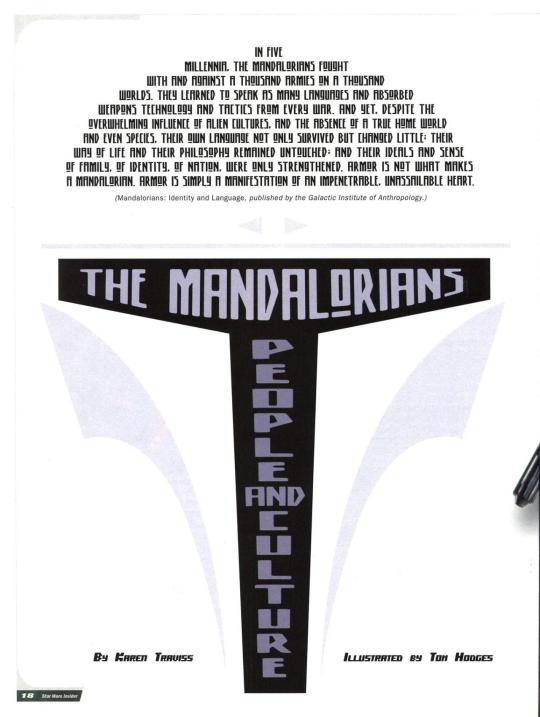
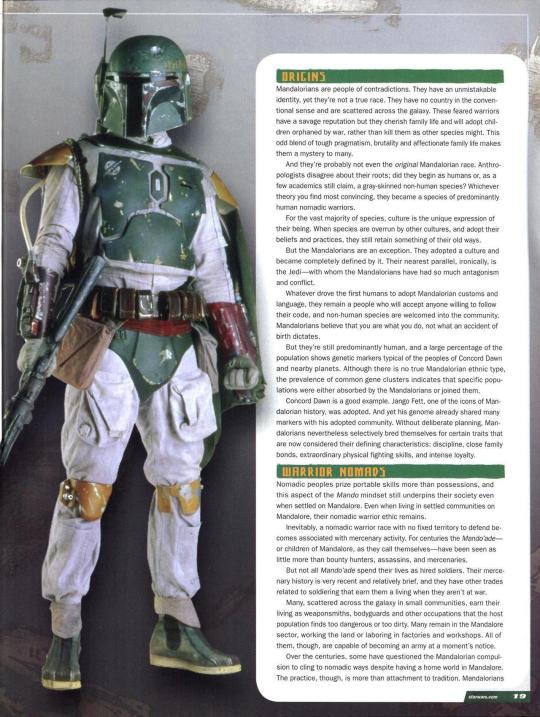
Transcript (gDocs, text) | JPEG files | PDF version
Below the cut: the article "Mandalorians: People and Culture" by Karen Traviss, originally published in Star Wars Insider magazine #86 in February 2006.
Transcript (gDocs, text) | JPEG files | PDF version
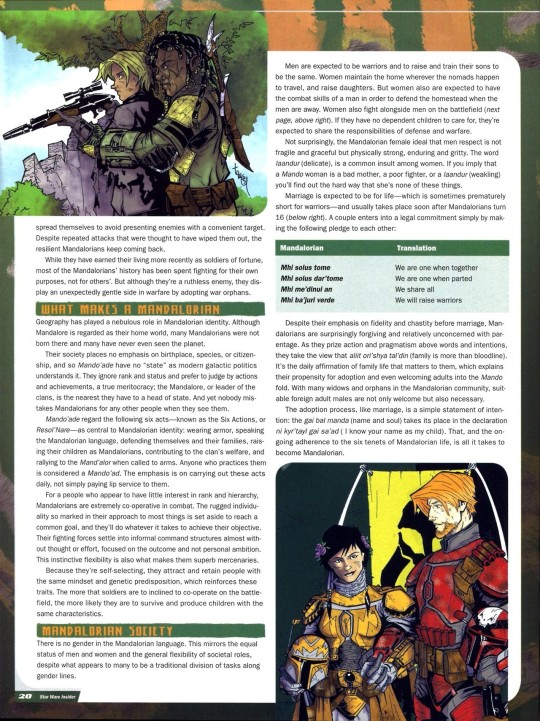
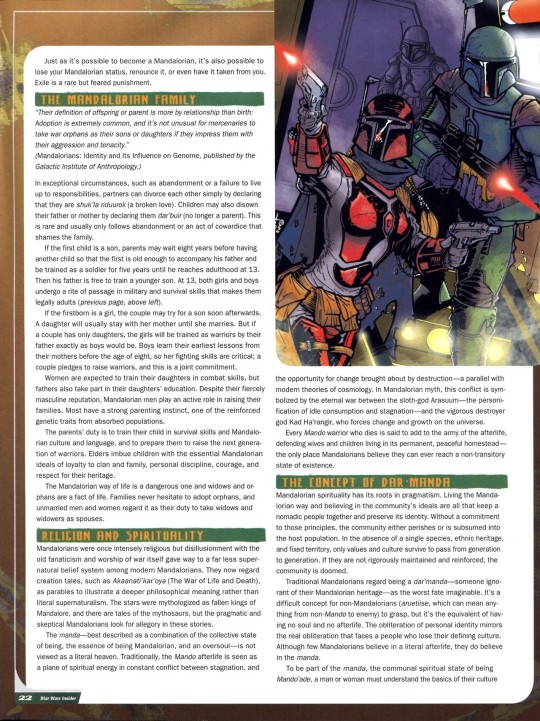
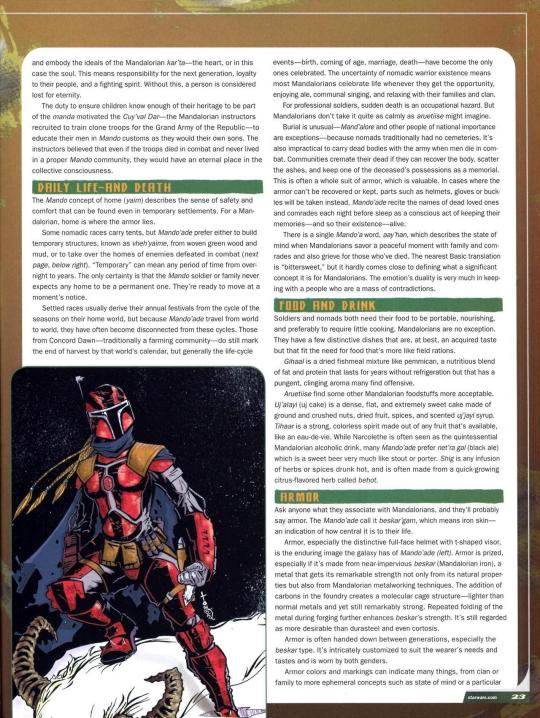
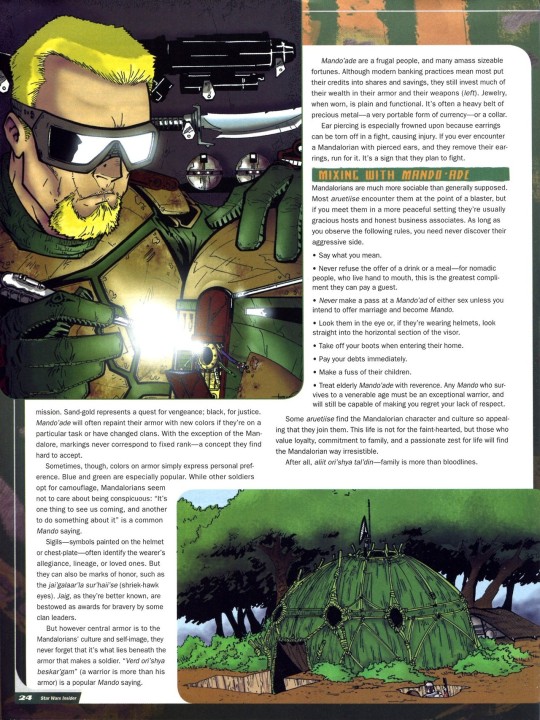
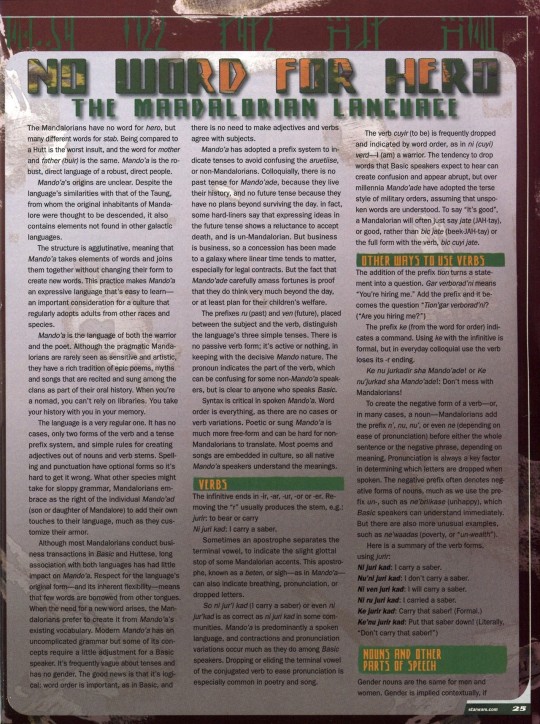
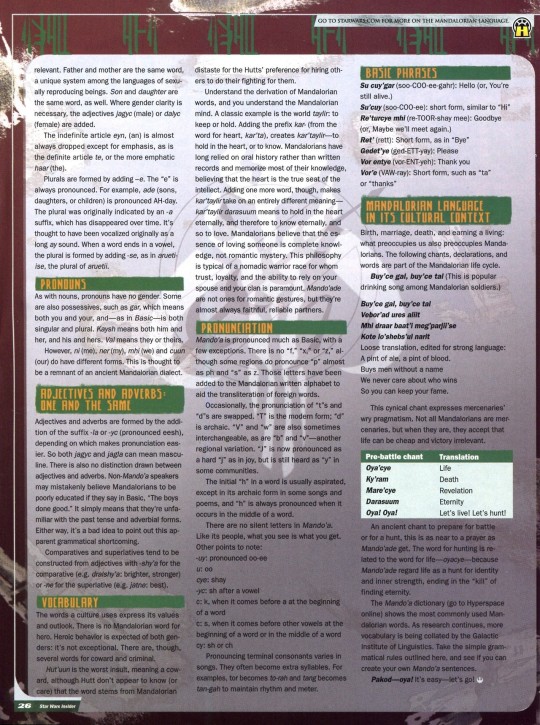
#Mandalorians#Star Wars#Mando'a#Star Wars Insider#article#magazine article#primary source#Mandalorian people#Mandalorian culture
19 notes
·
View notes
Note
What should I do about the lack of short vowel sounds in regards to names? Names like "Nick" or "Leia".
Mando'a actually does have a short vowel! E is pronounced as a short E (like in RED) when it's followed by a consonant.
In general, if a language doesn't have a specific sound built-in, it'll go to the closest equivalent. There's a trick to it though-- your eyes will lie to you! Think about how words sound, not how they're spelled. Ultimately, this is an exercise in subjectivity 'cause Accents, but I can at least give you an idea of how the process works.
For example, the closest for Nick isn't "Nik", which would be pronounced as (NEEK). The closest is actually "Nek" which is pronounced almost identically because it's another short, front vowel.
Leia doesn't have a short vowel for me, I pronounce it as (LEY-ah). I'm guessing the second syllable might be the short one for you, but without knowing exactly which vowel you use I can't say what the closest equivalent in Mando'a might be. Could end up as "Ley'ah" (Beten for syllable marker) or "Ley'a" (Beten as glottal stop) or something else entirely.
Again, at the end of the day it's all a matter of personal experience and opinion. There's no right or wrong answers, simply choose the option that makes the most sense to you.
11 notes
·
View notes
Note
how would you pluralize words ending in -ah? (skanah, eyayah) is there a guide for pluralization?
Fast answer: the plural for skanah (SKAH-nah) is skanahe (SKAH-nah-ey)
Explanation and alternatives under the cut
Explanation
There's two ways to pluralize a word in Mando'a, the -e and -se suffixes. The general rule is that if a word ends in a consonant you use -e and if it ends in a vowel you use -se. So vod becomes vode and buyca becomes buycase.
H is a consonant, so we can reasonably guess that -e is the correct way to pluralize. In English, we tend to mentally delete ending H's and treat them as silent, but in Mando'a no letters are silent (1). When we look at KT's dictionary (2) we see that words ending in H all explicitly include the ending H in the pronunciation column as well, which confirms our hypothesis and we can slap an -e on it.
Alternatives
Now it's time to get funky. Let's say that we understand the pluralizing rule just fine but we have a hard time actually saying the words it makes. Personally, I have a hard time going from the H to the E in skanahe. If I don't make the H distinct enough, it sounds like I'm merging vowels. If I make the H too distinct then there's always a small catch in my throat, which is its own meaningful sound in Mando'a (3) and that means I'm putting in an extra letter on accident. What can we do?
Beten (a). Instead of adding that extra letter, we can have it replace the H entirely and continue the plural as normal. Instead of skanahe we get skana'e. This carries on the drop-and-swap tradition in Mando'a, like in skana'din (1). Now, those two spellings will still sound very similar to folks unfamiliar with glottal stops (that throat-catch like the one represented by the dash in "uh-oh") but for those who do hear the difference it helps.
Beten (b). If you're worried about spelling confusion with the above, you can also use skanah'e, but be warned that some folks have very strong opinions on using Beten too much.
Use -se. Rangi, treat the H as silent and slap -se on the end to get skanah'se (SKAH-nah-sey). Gett'se does it (1), why can't we?
Sources and Notes
(1) Traviss, Karen. “Mandalorians: People and Culture”, Star Wars Insider #86. February 21, 2006.
(2) Traviss, Karen. “Dictionary”. Karen Traviss’ Website. 2012. https://web.archive.org/web/20120617235519/http://www.karentraviss.com/page20/page26/downloads/index.html.
(3) The "Beten" is the letter represented by an apostrophe in Mando'a. It's in the language name, for one, and can be pronounced a number of ways (1) including as a glottal stop.
8 notes
·
View notes
Photo

Ba’jur bal beskar’gam,
Ara’nov, aliit,
Mando’a bal mand’alor--
An vencuyan mhi.
---Rhyme taught to Mandalorian children to help them learn the Resol'nare [Republic Commandos: Order 66 by Karen Traviss, pg 12]
This month, we’re doing a series on the six central cultural tenets of Mandalorians: the Resol’nare (REY-sohl-NAH-rey). Mando’a for “Six Actions” the six Resol’nare tenets are: Ba’jur (education), Beskar’gam (armor), Ara’nov (self-defense), Aliit (family/clan), Mando’a (the language of Mandalorians), and the Mand’alor (rally to the Mandalorian leader).
For Mandalorians, practicing the Resol’nare connects them to their culture and identity as a Mando. Bloodline, heritage, or citizenship on a planet that shares the name of Mandalore might make you Mandalorian legally, but it’s the Resol’nare that makes you a Mando’ad. Those cut off from the Resol’nare and the culture by extension are dar’manda, without a soul.
The Resol’nare have only been covered in Extended Universe/Legends material, namely works by Karen Traviss and in Star Wars: The Old Republic. It has not been acknowledged yet in any shows or movies, though there’s speculation that the Creed Din’s covert follows is a variation on the traditional Resol’nare. We’ll spotlight each tenet in the upcoming weeks to explore the cultural side of Mandalorians.
This is the May.
#resol'nare#mandalorians#star wars#this is the may#mandalorian culture#Legends Canon#extended universe canon
40 notes
·
View notes
Text
Today we're spotlighting a resource that is incredible for anyone interested in Mandalorians:
MandoCreator

All the armor designs in this picture were made on MandoCreator.com. It has a very well-developed and extremely customizable kit-building app that has literally millions of possible combinations without taking into consideration any images or decals you upload yourself. There's also a gallery where you can browse others' creations for inspiration.
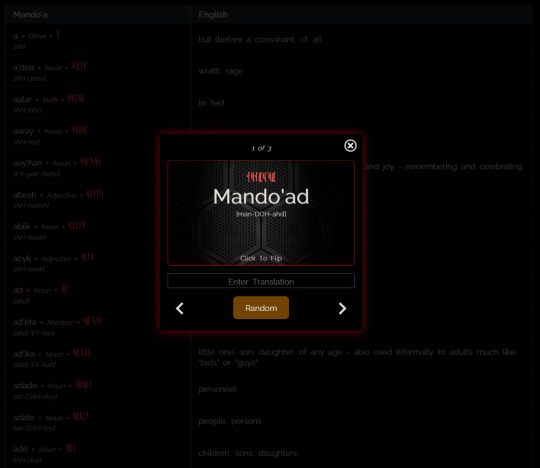
Recently MandoCreator expanded from armor design to language. It has a Mando'a-English dictionary that you can create flashcard decks from on the fly.
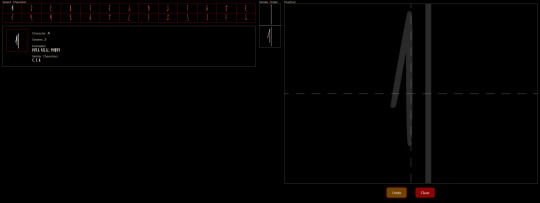
You can also learn to write and read Mandalorian scripts, both by drawing the characters and by transcribing original Mando'a works. Or, if you're in a hurry, it also has a transcription function.
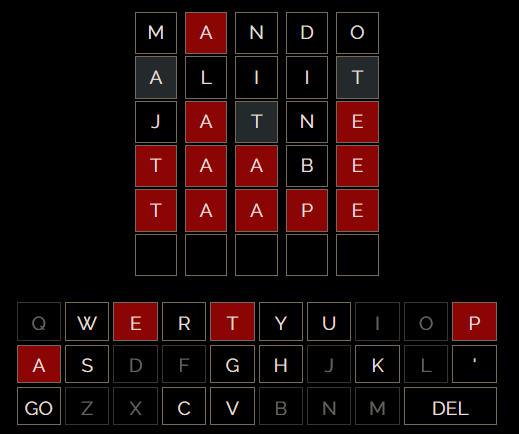
And for the cherry on top: there is Mando'a Wordle-- Mando'ardle if you will! Same rules as regular Wordle, but only using Mando'a words. (Don't worry, this screenshot is from 12 April)
MandoCreator is still actively in development. Keep tuned to their media pages for the latest updates!
125 notes
·
View notes
Text
KT Audio Clip 3/3
Revenge of the Sith Opening Crawler
This is the final entry in a series of three covering Mando'a audio samples from Karen Traviss. Transcript and (translation) is below the cut.
Akaan! Jetiise Tsad Droten trattok’or chur jurkade de kandosii Dar Jetii, Alor Dooku. Cuy ne’huttyc verde akaani par binta aliite. Ori’dush gayiyla.
(War! The Republic is crumbling under attacks by the ruthless Sith Lord, Count Dooku. There are heroes on both sides. Evil is everywhere.)
Ti kandosii’la nari, Beskar’ad Alor, Al’verde Grievous ru’keeni Jetiise Aloriya bal ru’shereshi Alor Palpatine, Alor b’Oyula Tsad.
(In a stunning move, the fiendish droid leader, General Grievous, has swept into the Republic capital and kidnapped Chancellor Palpatine, leader of the Galactic Senate.)
Vaal Beskar’adyc Akaan’ade kebbu viinir be’chaaj kyramu’la aloriya ti kaysh wadaasla vermircit, t’ad jetii alori aikiyc aka par tegaanalir mirci’la Palpatine.
(As the Separatist Droid Army attempts to flee the beseiged capital with their valuable hostage, two Jedi Knights lead a desperate mission to rescue the captive Chancellor…)
#mando'a#star wars#mandalorians#conlang#reference#extended universe canon#legends canon#pronunciation#audio#mp3
5 notes
·
View notes
Text
KT Audio Clip 2/3
Speeding Ticket
This is the second entry in a series of three covering Mando'a audio samples from Karen Traviss. Transcript is below the cut.
Lesson number two: sensible things to say when you’re pulled over by the police for speeding.
Su’cuy, alor. Tion meh ni lise narir par gar?
>Good morning, officer. What can I do for you?
Cuy tuur, alor, bal’ban ru ni shaadla iviinyc.
>It’s a fair cop, governor, I was indeed speeding.
#mando'a#star wars#mandalorians#conlang#reference#extended universe canon#legends canon#pronunciation#audio#mp3
6 notes
·
View notes
Text
KT Audio Clip 1/3
At the Keldabe Bistro
This is the first entry in a series of three covering Mando'a audio samples from Karen Traviss. Transcript is below the cut.
Today’s lesson: at the keldabe bistro: Shal epar’yaim keldabe.
Su’cuy gar jatne vode. Me’copaani?
>Good evening, sir, good evening, madam, what would you like?
Gedet’ye, ni copaani buyc’ika cin papur’gal
>I’d like a glass of white wine, please.
Tion copaani majyce?
>Would you care for anything else?
Elek. Buy’ce ne’tra gal.
>Yes, a pint of Guinness.
Oya, jatne vod.
>Coming right up, sir.
Bal t’ad tracyina kaminii ti shuk’la gett’se gedet’ye. Talyc.
>And two of the seared Kaminoan steaks with crushed nuts, please. Rare.
Kandosii, jatne vod.
>A wise choice, if I might say so, sir.
#mando'a#star wars#mandalorians#conlang#reference#extended universe canon#legends canon#pronunciation#audio#mp3
11 notes
·
View notes
Text
Mando'a Words by Theme
In the event you don't feel like sorting through literally thousands of words related to a single topic, this is your spreadsheet! It has the same columns as the dictionary above, but words are organized by themes and subcategories (listed below).
People & Family
Pronouns
People
Family
Groups
Numbers & Colors
Numbers
Colors (wow amazing)
Travel, Food, Money
Directions
Travel
Food
Drink
Flavor
Eat, Drink, Be Merry
Commerce
Insults & Swears to Start a Fight
Insults
Swears
Profession of Arms
Ranks and Units
Roles
Armor
Equipment
Operational Terms
Verbs for Violence
Phrases, Sayings, Expressions
no subcategories, just a hodgepodge
#mando'a#conlang#star wars#mandalorians#resource#reference#vocabulary#language#dictionary#linguistics#words by theme
222 notes
·
View notes
Text
Mando'a Dictionary
A gSheet that expands on the original lexicon published by Karen Traviss on her website and the one currently hosted on Mandoa.org. All columns are searchable, sortable, and filterable.* This dictionary features Parts of Speech, IPA pronunciation, a Source column, Syllable count (for those poem and song translations), and Stress patterns.
There are also multiple tabs, including one that explains IPA pronunciation, a Numbers tab, a Source Index, and three dialect tabs. Current dialects are Concordian (canon), Oyu'baatyc (fando'a), and Ruus'yc (fando'a). There is also an About tab with historical update information.
*If you have issues with any functions, save a copy of the dictionary to your computer or your gDrive.
#mando'a#conlang#star wars#mandalorians#dictionary#language#linguistics#reference#resource#extended universe canon#legends canon#disney canon
586 notes
·
View notes